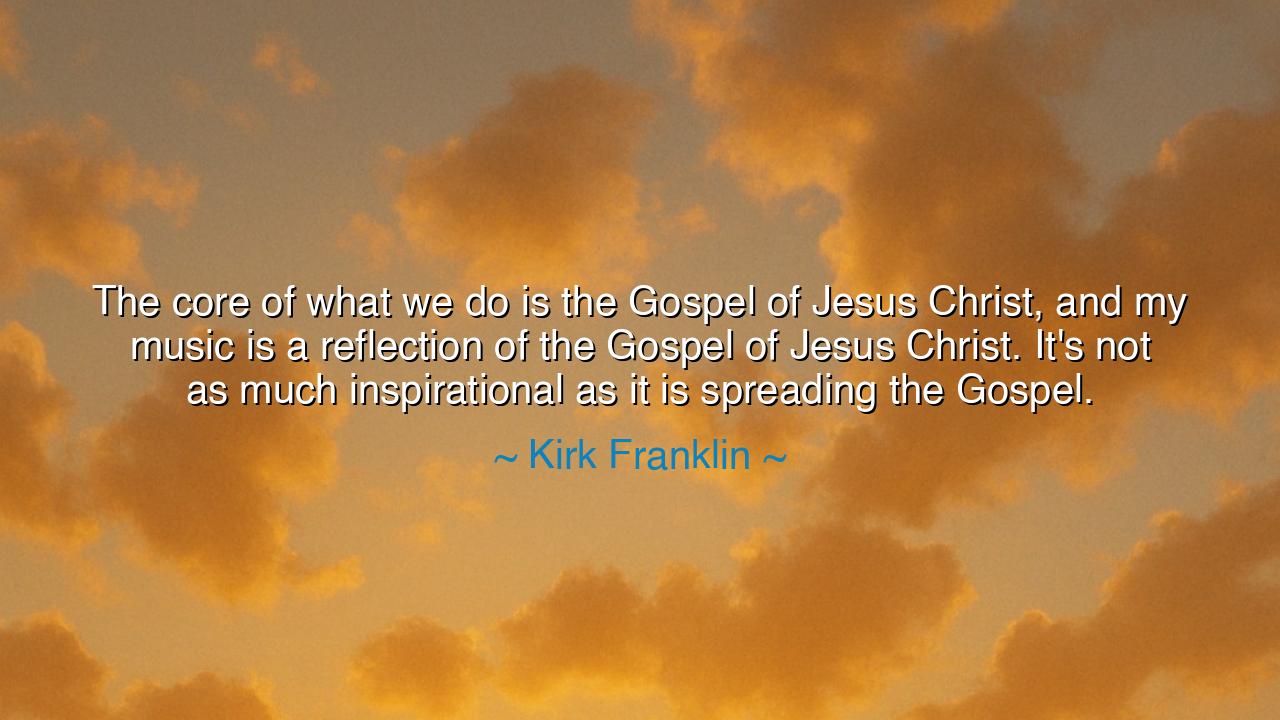
The core of what we do is the Gospel of Jesus Christ, and my
The core of what we do is the Gospel of Jesus Christ, and my music is a reflection of the Gospel of Jesus Christ. It's not as much inspirational as it is spreading the Gospel.






“The core of what we do is the Gospel of Jesus Christ, and my music is a reflection of the Gospel of Jesus Christ. It's not as much inspirational as it is spreading the Gospel.” — thus spoke Kirk Franklin, the psalmist of the modern age, whose voice unites choirs and generations in the rhythm of divine truth. In these words, Franklin reveals not merely his philosophy of art, but his calling — to make music not as entertainment, but as ministry. For him, melody and rhythm are not ends in themselves; they are vessels, carrying the living Word across the hearts of those who listen. His message is clear and eternal: that true creation springs from the Gospel, and that all art, when rooted in faith, becomes an act of worship.
The origin of this quote lies in Franklin’s lifelong devotion to Gospel music and the purpose that drives his work. Rising from humble beginnings, he did not seek fame in the halls of worldly acclaim, but sought instead to echo heaven’s harmony on earth. From his earliest compositions — Why We Sing, Stomp, Imagine Me — to his later anthems, Franklin’s music has been less about inspiration in a general sense, and more about proclamation: the spreading of the good news of salvation through Christ. Where many speak of hope in vague tones, he speaks with conviction, for his art is not born of abstraction, but of the Gospel truth that transformed his life.
When Franklin says, “It’s not as much inspirational as it is spreading the Gospel,” he draws a sacred distinction between inspiration and revelation. Inspiration uplifts the spirit; revelation transforms it. Inspiration stirs emotion; revelation awakens eternity. While the world may celebrate music that makes people feel good, Franklin seeks music that makes people know God. To him, the purpose of song is not merely to console or to entertain, but to bear witness — to announce the grace that redeems, the love that saves, the truth that endures. His art is therefore not self-expression, but divine expression — a mirror reflecting the light of the Gospel into the dark corners of the human heart.
This devotion to Gospel-centered creation finds echo in the story of Johann Sebastian Bach, another servant of sacred music centuries before Franklin. Bach, who signed his works with the words Soli Deo Gloria — “To the glory of God alone” — understood, as Franklin does, that music was not his own possession, but a gift to be offered back to its Giver. Each note, each harmony, was a prayer. He did not compose for applause, but for worship. And so his art endures beyond the centuries, for what is made for God bears the mark of eternity. Both Bach and Franklin remind us that the truest art is born not from ambition, but from adoration.
Yet Franklin’s words also serve as a rebuke to the age of performance — an age where artists seek followers more than faith. He stands as a reminder that the core of all we do must remain anchored in truth. To create without the Gospel at the center, he warns, is to build upon sand. For what is art without meaning, or beauty without purpose? The song that does not carry the light of truth may dazzle for a moment, but fades like mist in the morning sun. But the song that bears the Gospel lives forever — not because of the melody, but because of the message.
In this way, Franklin teaches that music — and indeed, all human work — can be sacred when it is devoted to the right cause. The Gospel of Jesus Christ is not only his message but his compass, his foundation, his joy. His success, though great, is not measured in awards or applause, but in souls reached and hearts renewed. Through rhythm and rhyme, through voice and harmony, he carries the Word to places where sermons cannot go. His music is a ministry in motion — a bridge between heaven and earth.
So, my listener, hear the lesson within his words. Whatever your craft, whatever your labor, let your core be anchored in truth. Let your work — whether in art, teaching, service, or creation — be a reflection of the Gospel, not just inspiration for its own sake. Do not seek to merely move others; seek to transform them. Let your actions be your song, your compassion your melody, your integrity your harmony. For when your purpose is clear and your heart aligned with the divine, your work becomes more than work — it becomes worship.
For in the end, Kirk Franklin’s words remind us that the greatest gift we can offer the world is not our talent alone, but our truth. The Gospel is not merely a message to be preached; it is a life to be lived and shared. When we center our art, our purpose, and our every effort upon it, we cease to be mere performers — we become messengers of light. And that, indeed, is the highest calling of all.






AAdministratorAdministrator
Welcome, honored guests. Please leave a comment, we will respond soon